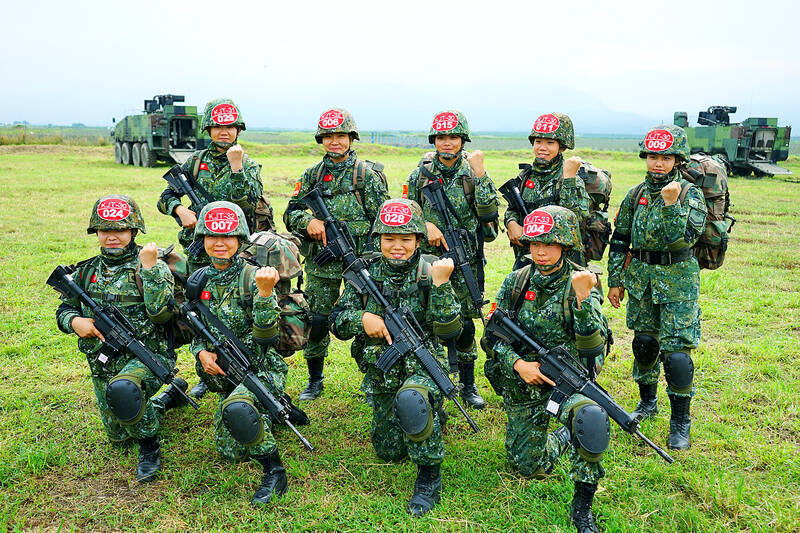A group of veteran female military personnel are today to start reservist training for the first time, a military source said yesterday.
The women have been asked to report to a “strategic location” in Taoyuan’s Bade District (八德) to complete the same required reservist training as their male counterparts, the source said, adding that they would have separate dormitories and bathrooms.
While the exact number of female trainees in the first group was not disclosed, the Ministry of National Defense previously said it would ask 220 women to undergo compulsory reservist training this year.

Photo: Chen Yen-ting, Taipei Times
As of 2021, 8,915 women were listed as reservists, and 15 percent of the nation’s 180,000 active military personnel are women, military data showed.
The ministry in January said it would begin training female armed reserve forces, after previously only training male reservists because it did not have sufficient capacity to accommodate men and women.
While men are required to take part in compulsory military conscription and reservist training, women are not, but can join the armed forces voluntarily.
The military runs a dual-track reservist training program, which consists of a new, more intensive 14-day plan, launched last year, and the old system of five to seven days of training.
The ministry said it would increase the number of reservists receiving 14 days of training from 15,000 last year to 22,000 this year, while 96,000 trainees would still participate in the old plan.
The training in both tracks has been changed to “strategic locations” so that reservists can develop a better understanding of the terrain and key infrastructure in the area they are charged with defending.
The change is expected to speed up mobilization and facilitate combat deployments during wartime, the military said.

‘CORRECT IDENTIFICATION’: Beginning in May, Taiwanese married to Japanese can register their home country as Taiwan in their spouse’s family record, ‘Nikkei Asia’ said The government yesterday thanked Japan for revising rules that would allow Taiwanese nationals married to Japanese citizens to list their home country as “Taiwan” in the official family record database. At present, Taiwanese have to select “China.” Minister of Foreign Affairs Lin Chia-lung (林佳龍) said the new rule, set to be implemented in May, would now “correctly” identify Taiwanese in Japan and help protect their rights, the Ministry of Foreign Affairs said in a statement. The statement was released after Nikkei Asia reported the new policy earlier yesterday. The name and nationality of a non-Japanese person marrying a Japanese national is added to the

AT RISK: The council reiterated that people should seriously consider the necessity of visiting China, after Beijing passed 22 guidelines to punish ‘die-hard’ separatists The Mainland Affairs Council (MAC) has since Jan. 1 last year received 65 petitions regarding Taiwanese who were interrogated or detained in China, MAC Minister Chiu Chui-cheng (邱垂正) said yesterday. Fifty-two either went missing or had their personal freedoms restricted, with some put in criminal detention, while 13 were interrogated and temporarily detained, he said in a radio interview. On June 21 last year, China announced 22 guidelines to punish “die-hard Taiwanese independence separatists,” allowing Chinese courts to try people in absentia. The guidelines are uncivilized and inhumane, allowing Beijing to seize assets and issue the death penalty, with no regard for potential

‘UNITED FRONT’ FRONTS: Barring contact with Huaqiao and Jinan universities is needed to stop China targeting Taiwanese students, the education minister said Taiwan has blacklisted two Chinese universities from conducting academic exchange programs in the nation after reports that the institutes are arms of Beijing’s United Front Work Department, Minister of Education Cheng Ying-yao (鄭英耀) said in an exclusive interview with the Chinese-language Liberty Times (the Taipei Times’ sister paper) published yesterday. China’s Huaqiao University in Xiamen and Quanzhou, as well as Jinan University in Guangzhou, which have 600 and 1,500 Taiwanese on their rolls respectively, are under direct control of the Chinese government’s political warfare branch, Cheng said, citing reports by national security officials. A comprehensive ban on Taiwanese institutions collaborating or

STILL COMMITTED: The US opposes any forced change to the ‘status quo’ in the Strait, but also does not seek conflict, US Secretary of State Marco Rubio said US President Donald Trump’s administration released US$5.3 billion in previously frozen foreign aid, including US$870 million in security exemptions for programs in Taiwan, a list of exemptions reviewed by Reuters showed. Trump ordered a 90-day pause on foreign aid shortly after taking office on Jan. 20, halting funding for everything from programs that fight starvation and deadly diseases to providing shelters for millions of displaced people across the globe. US Secretary of State Marco Rubio, who has said that all foreign assistance must align with Trump’s “America First” priorities, issued waivers late last month on military aid to Israel and Egypt, the